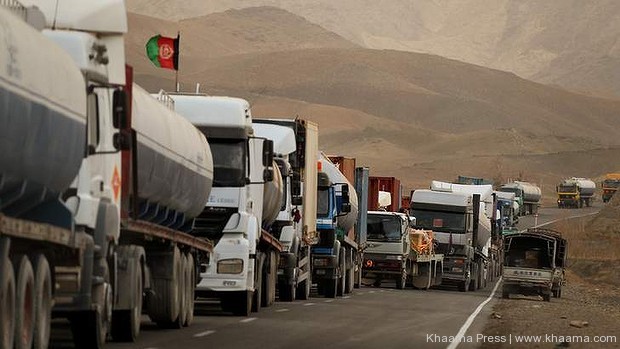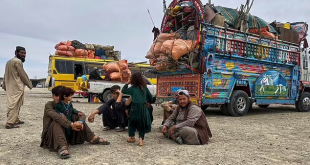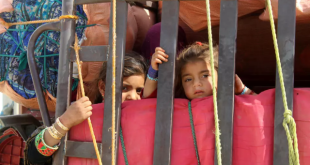By Akhtar M. Nikzad-KABUL: Importing cheap food items from foreign countries have affected the domestic food production in the country. Cheap imports are a worrying sign for Afghan industries. Imported edible items are cheaper than the locally produced because the quality of the latter is far better than the former. As a result the local products are unable to in the market.
A number of food manufactures criticized the government for not providing the essential support to the local industries. They said that foreign cheap and low quality food items are affecting their productions.
They claimed the government has not provided any required facility for improvement of domestic production in the last 14 years. The cold-shoulder response pushed many local companies deeper into the crisis.
Manager of Kabul Dairy Productions Unity, Nik Mohammad Noorani, in an interview with Afghanistan Times said that there are five companies in all Afghanistan that produce dairy products, but due to import of low quality and cheap products, these companies are on the verge of collapse.
He said that today most of the markets are flooded by foreign-produced cheap products and people usually prefer to purchase such items as a result of its cheaper price and the trademarks.
“People do not care about low quality and even though do not pay attention to the expiry date but prefer foreign dairy products due to its low price. That is why Afghanistan is a suitable market for foreign products and there is no support from the government for local production,” he said.
He underlined that there is no control center to check the quality of the imported dairy products, adding that most of these products are made from chemicals or plant juice in a bid to have long shelf time.
Noorani acknowledged that daily around three tons of dairy products are imported to Kabul alone, through legal and illegal ways, and hampered the local production.
“If the government increases custom duties over foreign-manufactured food products the local industries will nourish,” he suggested.
Kabul Dairy Productions Unity has 1,500 workers and nine cooperatives. Every day the factory collects around 5,000 liter of milk from Logar and Maidan Wardak provinces. After processing the milk, the factory produces cheese, cream, butter, curd and buttermilk. These products are sold through 25 outlets in Kabul city. In the factory women have ten percent role in the productions.
According to Noorani in the near future the capacity of the factory would increase to collect 20,000 liter milk with cooperation of Food Agriculture Organization of the United Nations.
Afghan economy is agricultural. Nearly 80 percent of the population relies directly or indirectly on agriculture. About 65 percent of rural population depends on agricultural and livestock to feed family members. On the other hand, Afghanistan is a consumer country which loses great portion of money on purchase of the foreign goods.
Pakistan and Iran are the main exporters of food times to Afghanistan. Both countries are the fastest growing importers of food stuff in the region. Not long ago, President Muhammad Ashraf Ghani has said that Afghanistan annually buys worth three billion US dollars foodstuff from the neighboring counties. He termed it a challenge in front of the national economy growth process.
Sayed Akbar Sadat, a beekeeper, said that he received five boxes from Food and Agriculture Organization of the United Nations, ten years ago to produce honey and promote apiculture in the country.
He said that in the past ten years his business has grown and now he has 400 boxes. Sadat earns Afs40,000 annually from his business.
“I have 16 employees, including my family members. The honey we provide is pure. Therefore, our market is satisfactory but some unknown trademarks influenced the local apiculture,” he lamented.
He pointed out that beekeeping or apiculture is not promoting according to the standards. Beekeepers are using traditional methods. Therefore, the beekeeping as a profession and business remained on slow track.
Afghanistan is a mountainous country and depends on agriculture. Therefore, the country is a suitable place for apiculture to produce adequate quantity of natural honey and meet the demand side.
Role of Ministry of Agriculture, Irrigational and Livestock (MAIL) is important to encourage the beekeepers and promote the apiculture. Beekeeping can create job opportunities and enhance family’s incomes.
Akram Amiri, a shopkeeper, said that sale of foreign-made products put local industries at risk of collapse because people are unable to buy local food stuffs with high cost. Therefore, mostly foreign products captured the markets and remained as a barrier towards local manufacturers.
“If more foods were to come from local and regional sources then it would benefit the local economies and more money will move in the country, creating value and employment,” he said.
Mir Amanuddin Haidari, Deputy Minister of Agriculture, said that promotion of agriculture and provision of facilities for self-sufficiency is one of the effective strategies for improvement of families’ economy. He said that fight against poverty is underway and the ministry initiated several steps in this regard in the past 14 years.
He said that in the past 11 years the ministry trained around 500,000 women in agriculture sector, adding that establishment of small family farms including apiculture, pisciculture, poultry, livestock, horticulture and collection of production are the main steps that the ministry had taken in the rural areas.
The deputy minister said that still Afghanistan is also a producer country and annually manufactures worth three billion US dollar goods but it is not adequate to reduce poverty in the country.
 Afghanistan Times
Afghanistan Times




